What Is Spread Betting?
Spread betting in sports betting is a type of bet where your winnings (or losses) are based on the accuracy of your wager. This means that the more accurate your bet is, the more you win - but also the reverse, that the less accurate it is, the more you lose.
For a lot of people, it takes a little time to get their head around exactly how it works, as it’s such a different model from the more familiar fixed odds betting we’re used to. It’s also a much newer concept, emerging as a betting practice in the late 1980s.
Although it’s increased drastically in popularity since then, it’s still a very niche form of betting when compared to traditional sports betting, which occupies the vast majority of the market.
In this article, we’ll take you through all the fine detail of how spread betting works, why you might want to try it, and the best bookies and strategies to use - as well as how to limit the risk of excessively high losses with this especially volatile type of bet.
Spread Betting Basics
In spread betting, rather than betting on whether a particular outcome will occur (e.g. that a particular team will win a match), you bet on whether a particular statistic will be higher or lower than a predetermined range set by the bookie.
This range is known as the ‘spread’, and you ‘buy’ or ‘sell’ depending on whether you predict that the statistic will be higher (buy) or lower (sell) than the range given. Your stake is then multiplied by the difference between the value you bought or sold at and the actual statistic in the match.
This probably sounds quite confusing, so we’ll illustrate the principle with a couple of examples.
We’ll take an imaginary football match, and look at the Total Goals market. In this case, we’ll say the spread offered by the bookie is 2.8 - 3. If we think the total number of goals in the match will be higher than 3, we would buy, whereas if we expect it to fall below 2.8 we would sell.
On the basis of a £10 stake, we would have the following outcomes if we decided to buy:
0 total goals - £30 loss ((0 - 3) x 10)
1 total goals - £20 loss ((1 - 3) x 10)
2 total goals - £10 loss ((2 - 3) x 10)
3 total goals - break even ((3 - 3) x 10)
4 total goals - £10 profit ((4 - 3) x 10)
5 total goals - £20 profit ((5 - 3) x 10)
6 total goals - £30 profit ((6 - 3) x 10)
And so on
And if we decided to sell, the outcomes would be as follows:
0 total goals - £28 profit ((2.8 - 0) x 10)
1 total goals - £18 profit ((2.8 - 1) x 10)
2 total goals - £8 profit ((2.8 - 2) x 10)
3 total goals - £2 loss ((2.8 - 3) x 10)
4 total goals - £12 loss ((2.8 - 4) x 10
5 total goals - £22 loss ((2.8 - 5) x 10)
6 total goals - £32 loss ((2.8 - 6) x 10)
And so on
As you can see, if we’re buying there is no theoretical limit to the amount of profit we might make, whereas if we sell there’s no theoretical limit to the possible loss.
Of course, football matches with very large numbers of goals are rare, but they do happen, so it’s important to consider the possible risk/reward when spread betting.
Spread Betting In Sports
Because spread betting takes the form of a bet on a particular statistic within a sport, rather than simply betting on the winner of an event, it will work slightly differently depending on the sport one is betting on.
If you’re ever unsure of exactly how a market works, you can usually check by hovering over the ‘i’ next to any individual market on the major spread betting sites in the UK.
Football
Football is probably the most popular sport for spread betting in the UK. Popular markets include supremacy (i.e. the number of goals one team beats the other by), total goals, shirt numbers (the total you get when adding up the shirt numbers of all goalscorers in a match), bookings and corners - but there are plenty of other markets as well, of varying complexity.
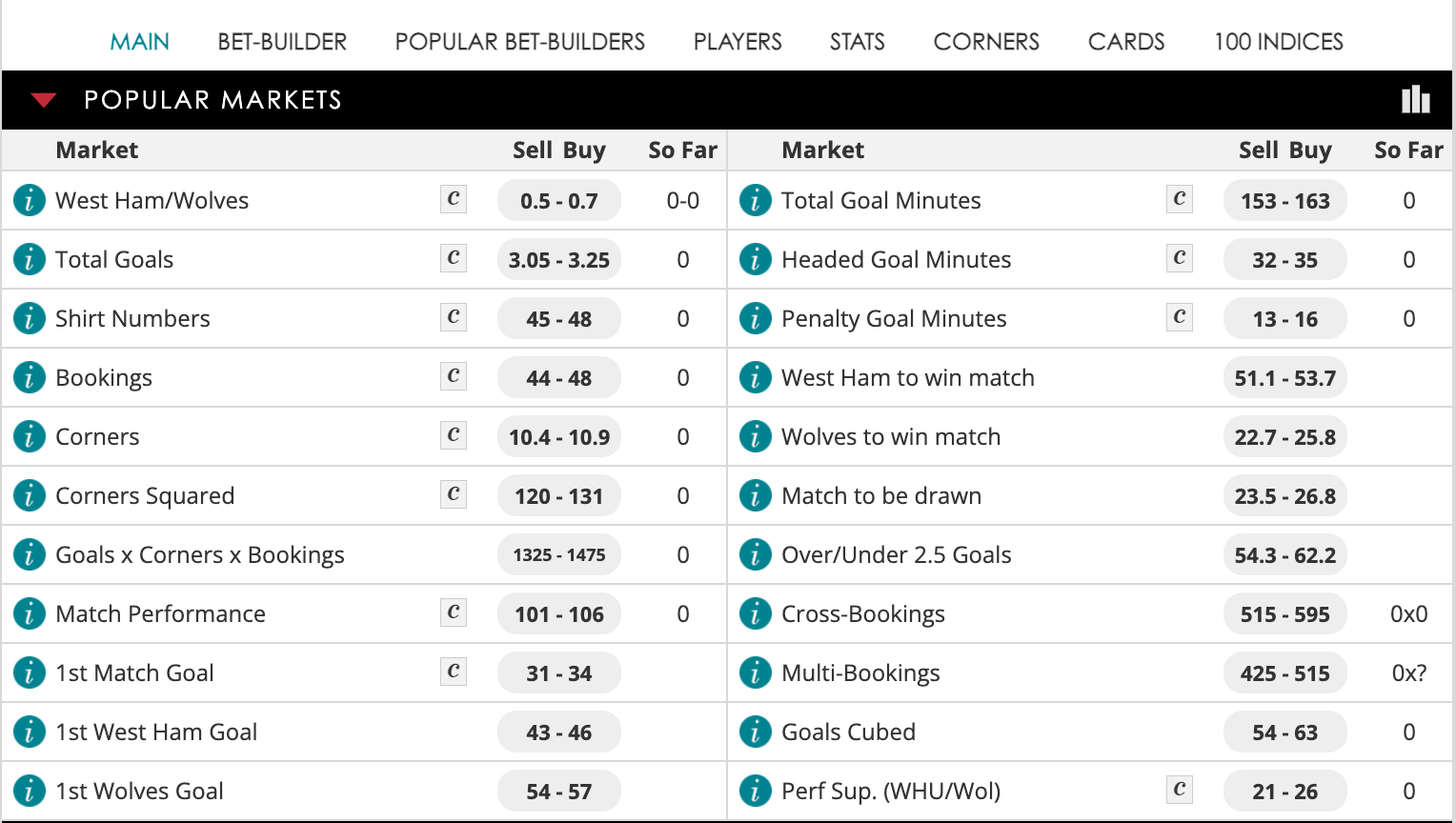
Horse Racing
Things can get rather more variable with horse racing, depending on the bookie you decide to bet with. Some bookies will offer ‘winning distance’ markets, where you bet on the distance a horse ends up winning a race by.
Others have a points system for each race (and also for overall performance during a particular day or festival), where a horse receives points for a win, a smaller number of points for a place, and 0 points for any other finish.
You can then bet on the number of points a horse will receive in a race, or the number of points a jockey will receive during the course of a day’s racing.
There are plenty of other horse racing markets available when spread betting as well, some of which seem comically convoluted.

If you’re keen to try out horse racing spread betting, your best bet is to check out a spread betting bookie to take a look at the markets on offer - but do make sure to do your research before placing any bets.
Tennis
Markets for tennis are roughly as you’d expect - they include match supremacy (the margin by which a particular player has won), total sets, games or points, total of games/points for each player, and a few other more obscure options.
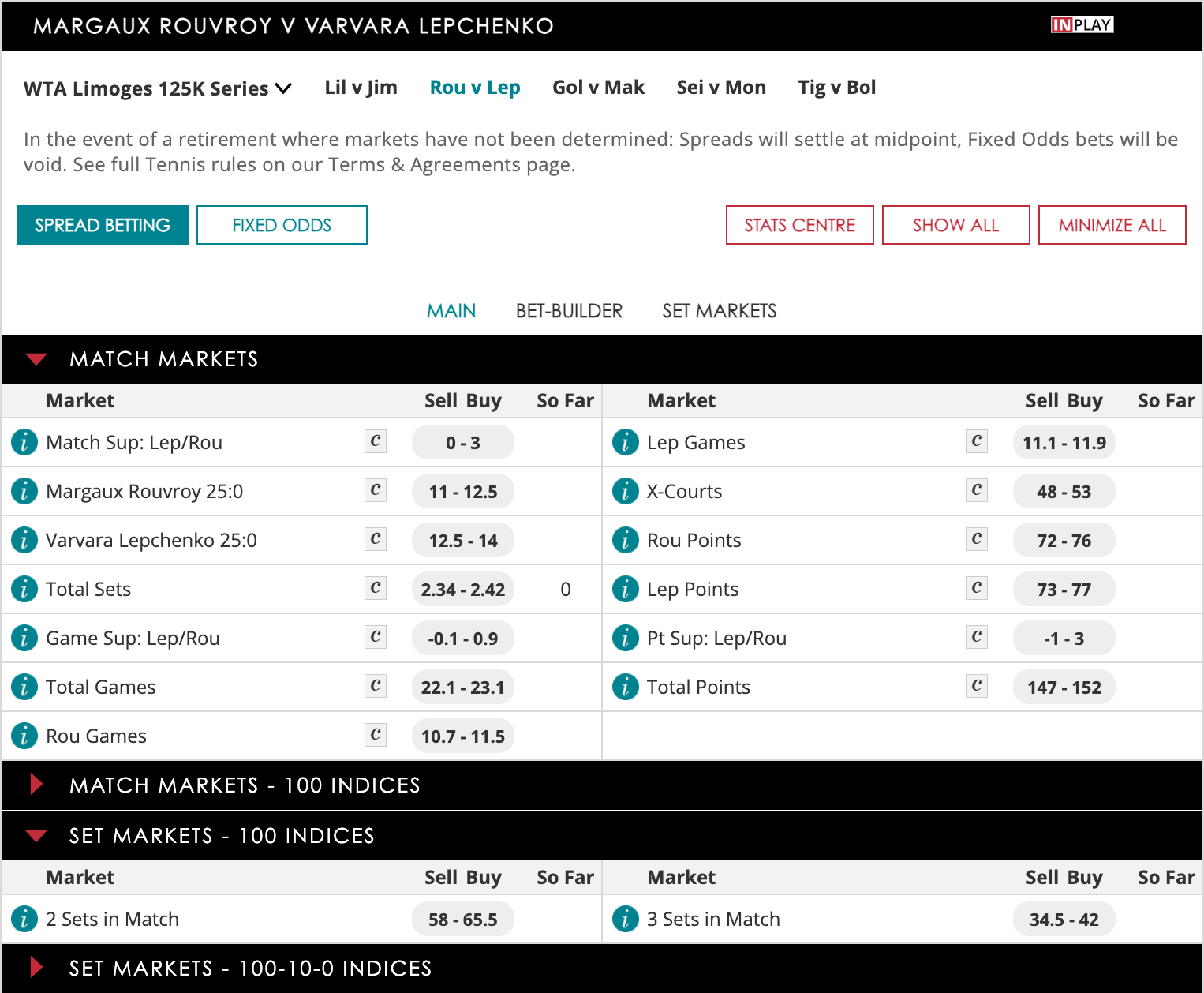
Cricket
In cricket, spread betting markets will often hinge on assigning teams a certain number of points for a win, draw or loss, with the spread indicating the number of points a team wins.
You can also bet on the total number of runs in a match, the total number of runs from a particular player, or the number of runs within an innings.
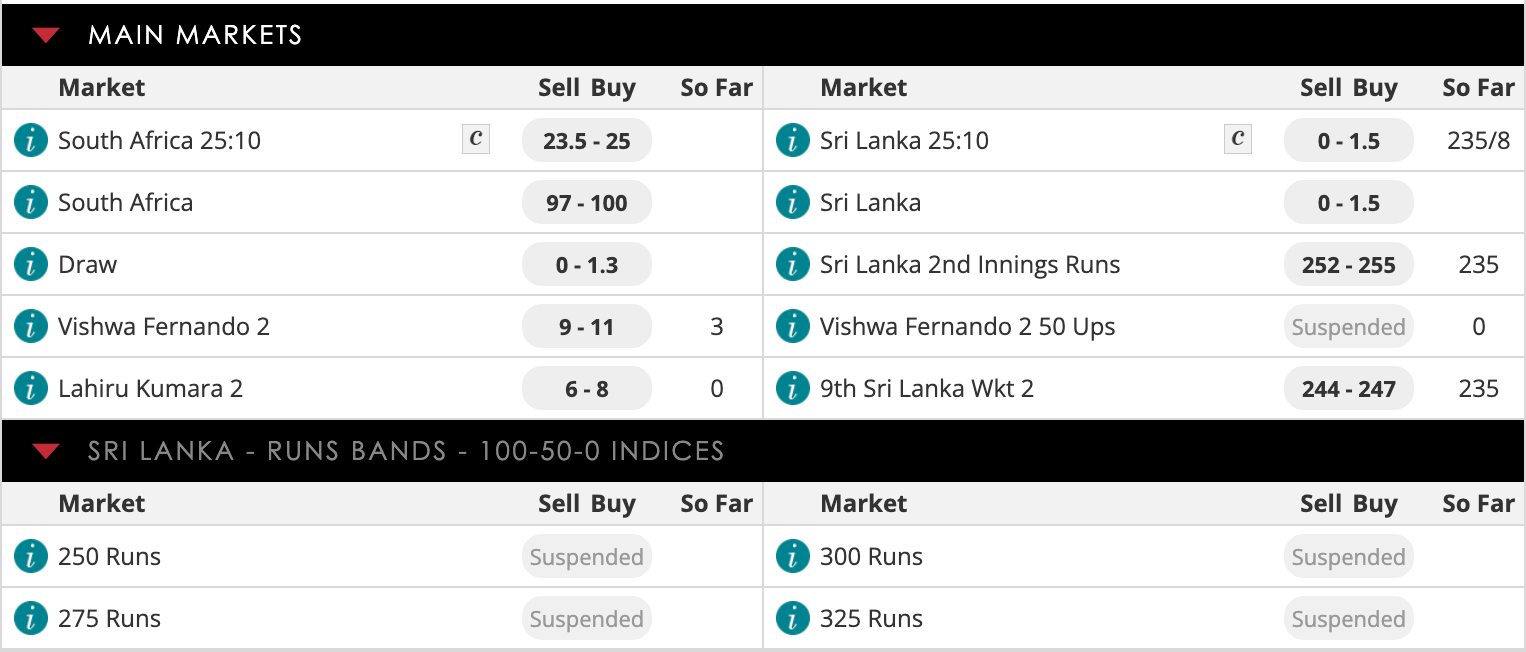
Other Sports/Events
It’s possible to find spread betting markets for an impressively wide range of sports, including cycling, beach volleyball, motorsports and even politics, during major events.
Each will have its own particular kinds of markets, so if you do start branching out into more obscure sports, make sure you understand exactly what you’re doing and how those markets work before you put your money at risk.
How Does Spread Betting Compare To Fixed Odds Betting?
The most crucial difference is that you don’t know in advance how much you stand to win or lose.
When fixed odds betting, you know when you place your bet that you’ll either win, and make a certain amount as your return, or you’ll lose, in which case you’ve lost your stake.
With spread betting, your potential profits will vary depending on the actual outcome of the event - and so do your potential losses.
This can make your betting more exciting, but it is also much higher risk - and it’s definitely not a good idea if you’ve ever had any difficulties with gambling addiction.
What’s The Difference Between British And American Spread Betting?
If sports betting terminology weren’t already confusing enough, certain terms don’t even mean the same thing everywhere. Spread betting is something very different in the USA, so make sure you know which one you’re looking at!
American spread betting does bear some similarity to British spread betting, in that it involves betting on whether a certain statistic will come in higher or lower than a certain value.
However, in American spread betting you’re normally betting on the difference of points between two teams.
A bookmaker will advertise a spread of a certain value, and you’ll bet on whether a team will beat their opponents by at least that number of points.
For example, if a bookmaker advertises a spread of 4, you can bet on either the favourite or the underdog.
If you bet on the favourite, they need to win by a margin of at least 4 for you to win your bet. If you bet on the underdog, meanwhile, they need to lose by a margin of less than 4 for you to win (or the underdog could win altogether).
What’s The Difference Between Sports And Financial Spread Betting?
Financial spread betting works very much like sports spread betting, except that you’re betting on the price of a stock or commodity, rather than a particular sports market. You profit for each point the market moves in your direction, and you lose for each point it moves against you.
Because the risk of potential losses is very high with financial spread betting, it’s common to employ measures to close your bet if it moves a certain amount in either direction.
These are known as a ‘stop loss order’ - which closes your bet if the price moves too far against you - and a ‘take profit order’ - which closes your bet when the price moves a certain degree in your favour, allowing you to lock in your profit at that point.
Financial spread betting allows the bettor to profit from trading without having to actually own the stock in question, but it does mean that the bettor is simply engaging in gambling, rather than any kind of true investment.
The advantage to this in the UK is that gambling profits are tax free - but the disadvantage, of course, is that the house always wins, and, although some financial spread bettors may enjoy some success, ultimately the bookmakers wouldn’t be offering markets if they weren’t making a profit themselves.
Which Bookies Are Best For Spread Betting?
Spread betting is still relatively niche, and you’ll struggle to find much in the way of spread betting markets with most bookmakers. You have two main options for sports spread betting within the UK: Spreadex and Sporting Index.
These two websites are in fact now both owned by the same company, Spreadex having acquired Sporting Index’s retail business in 2023. This has prompted concerns from the Competition and Market Authority, given that the two companies were each other’s only real competition.
The two websites are now almost identical, so the practical upshot for most casual bettors is that the only important difference between the two is their welcome offers (Spreadex’s being somewhat more generous).
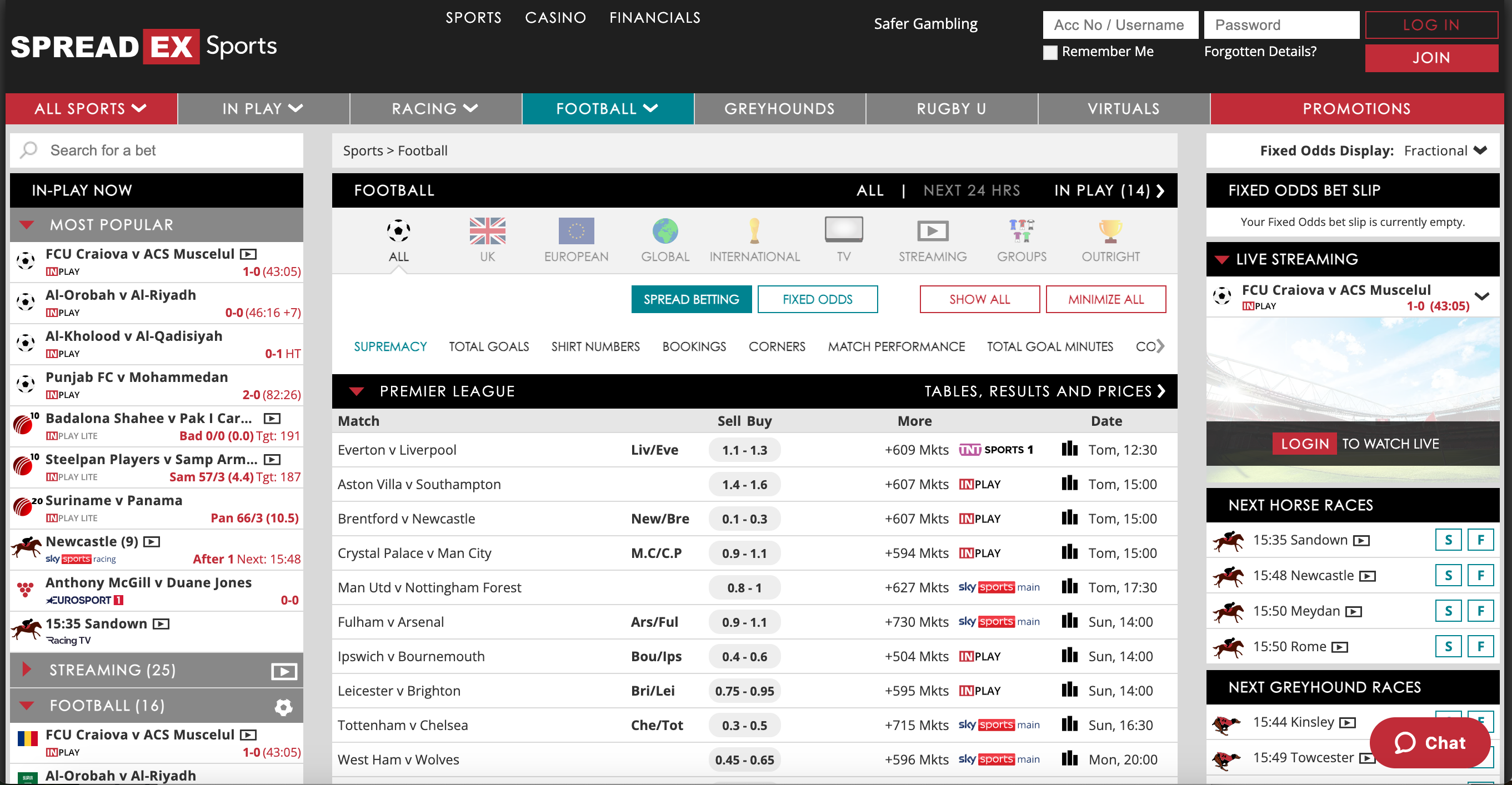
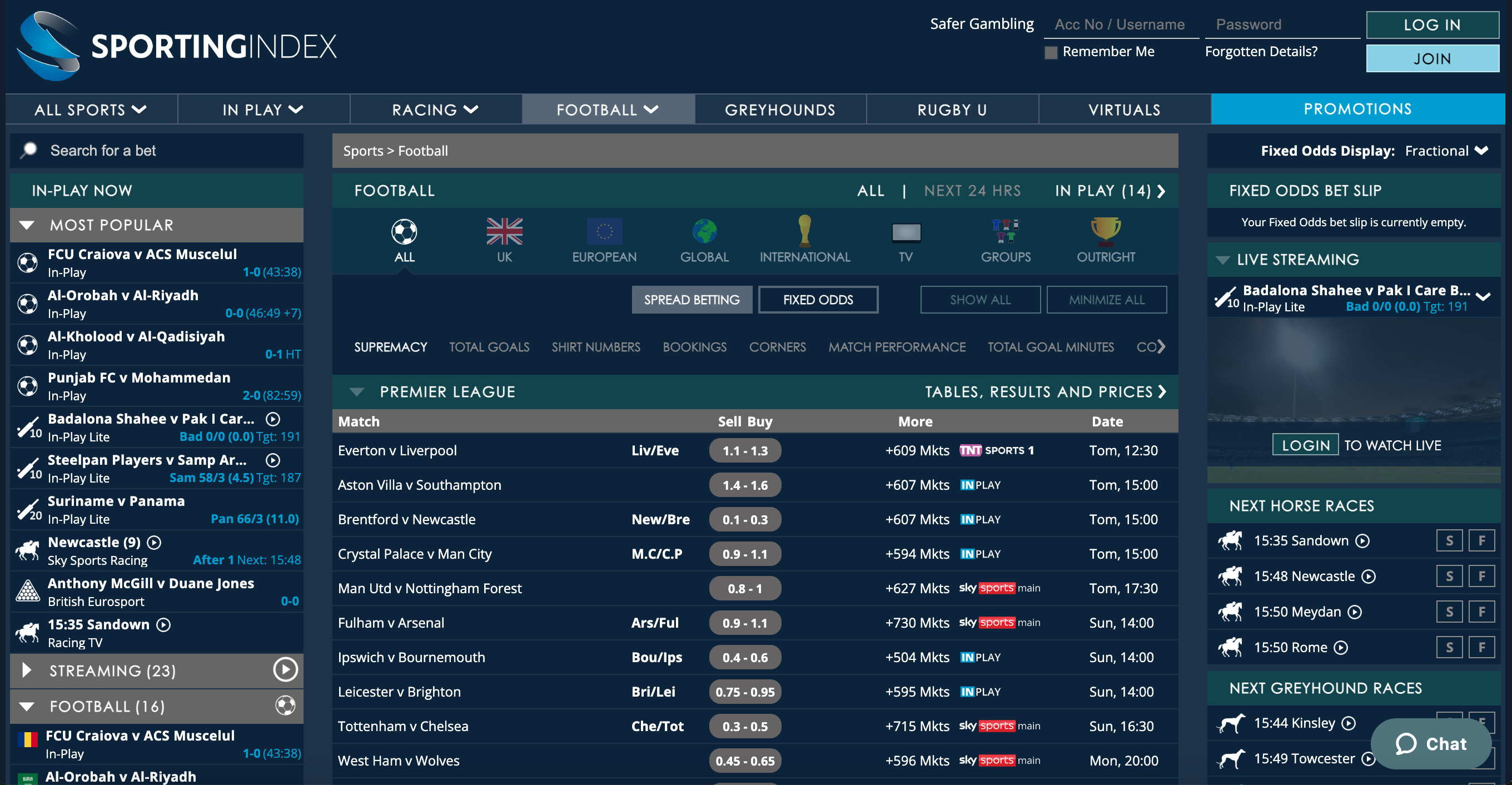
What Are The Best Spread Betting Strategies?
If you’re a newcomer to spread betting, it’s crucial to manage the level of risk you’re exposing yourself to, given the inherent volatility of spread betting. To minimise your potential losses, and maximise your chances of success, we’d recommend the following:
- Start with small stakes. Even if you’re especially confident in a particular bet, it’s definitely best to take it slowly to begin with. Given that your stake is multiplied by the number of points you’ve won or lost by, the amounts can get very large very quickly if your stake is too high.
- Work out the worst case scenario. Before placing any bet, do a quick calculation to establish what your worst case scenario outcome would be. If your loss is more than you can afford, even if it’s highly unlikely, it’s best not to place the bet at all.
- Do your research. You should stick to sports you have a good amount of experience of, and markets you fully understand. Many markets are self explanatory (e.g. total goals) but others are much more complex, and it’s extremely unwise to place a bet when you don’t know exactly how the result will be calculated.
Advantages And Disadvantages Of Spread Betting
Advantages
- The potential for very high profits. Depending on the exact sport and market, there may be no real limit on the amount of profit you could make.
- Added excitement. With fixed odds betting, you have two possible outcomes - win or lose. This can mean that the excitement of a sports match or race can be over relatively quickly, especially if there’s a clear favourite to win. But with spread betting, where each goal could increase your profit, you’re more likely to be fully engaged for the entirety of the event.
Disadvantages
- The potential for very high losses. With the potential for significant profit comes the potential for significant loss. Spread betting is significantly more volatile than fixed odds betting, and this puts the bettor in an inherently vulnerable position.
- Added risk for problem gamblers. The greater excitement of spread betting is perhaps the worst possible thing for anyone who struggles with gambling addiction. If you’ve ever had trouble with problem gambling in the past, we’d strongly advise you to steer clear of spread betting.
Is There A Less Risky Alternative?
It can’t quite keep up with spread betting for excitement, but Matched Betting has something rather better to offer - guaranteed profits with zero risk of losses, so long as you follow the instructions correctly.
This is a technique that involves placing bets both for and against a certain outcome to earn free bets, which allow you to make a profit regardless of the result.
Most offers run along the lines of ‘Bet £10 and get a £10 free bet’. By matching the first bet, you break even - and you’re then able to make a profit on the free bet.
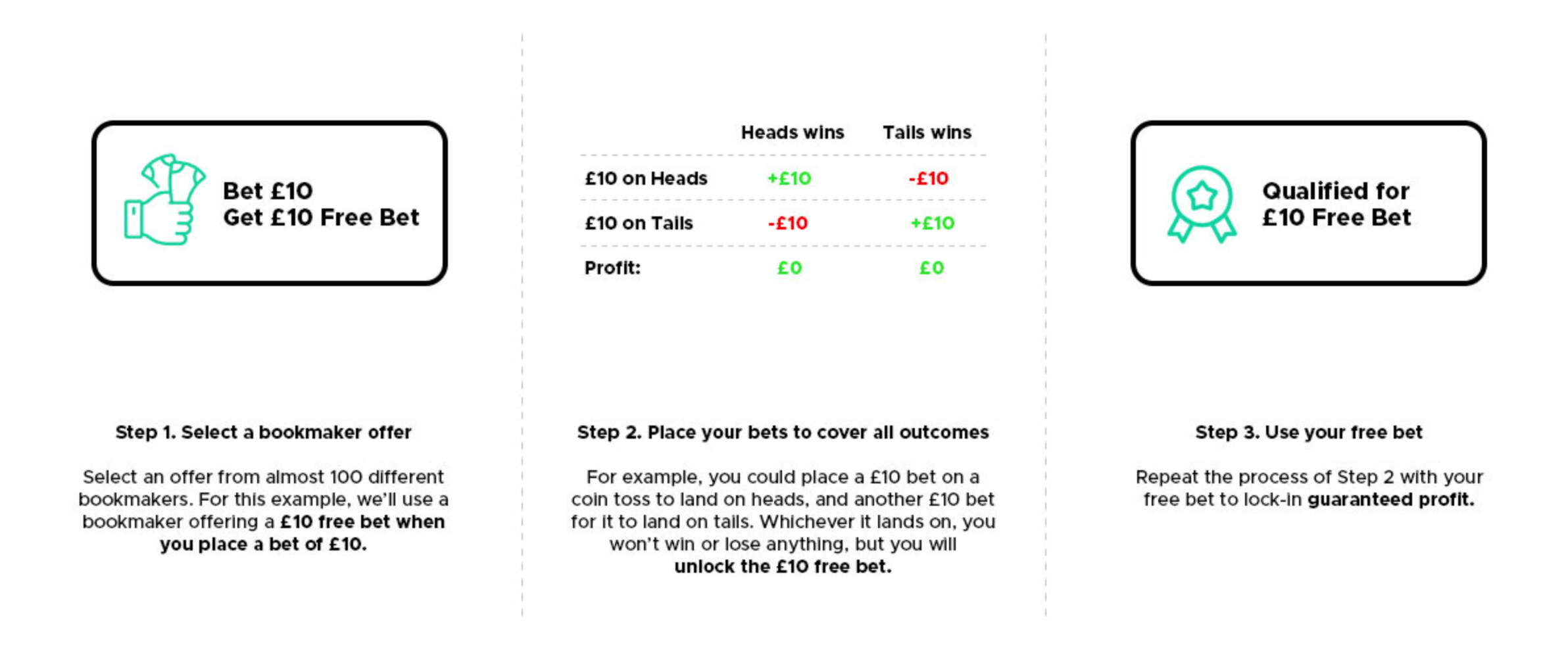
To find out more about how Matched Betting works, check out our complete guide for beginners - or if you’re keen to get stuck in, sign up for our free trial to get going straight away.
Summary
Spread betting has a lot to offer the more adventurous sports bettor - but it has its downsides too. There’s the potential to enjoy significant winnings, but just as much potential for significant losses.
If you’re particularly keen to get into spread betting, there’s certainly nothing to stop you - but as an alternative, Matched Betting is hard to beat when it comes to profit-making, and it’s a much safer option.
If you’re wondering how to get started, Outplayed’s free trial is the perfect way to learn all about Matched Betting and start making your first profits today.
Updated: 2 Jan 2025
The Author
Stephanie is a published author and, having taken up Matched Betting fairly recently, she knows exactly how beginners feel when they first start Matched Betting. She loves breaking down complex subjects in straightforward terms to make them accessible to newcomers, and to speed them on their way to making their first profits.

